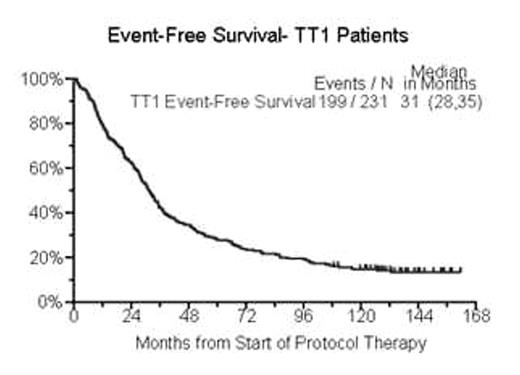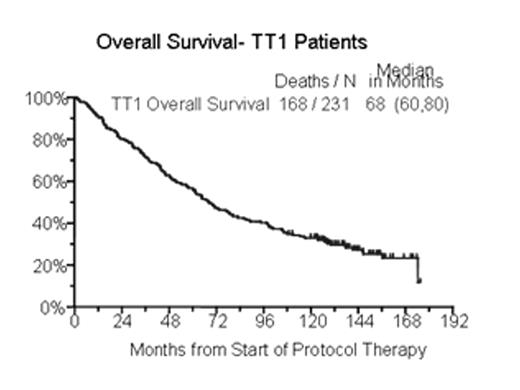Abstract
Background: Melphalan-based high-dose therapy (HDT) with autologous peripheral blood stem cell support has become the standard of care for newly diagnosed patients with MM, based on IMF90 and MRC7 trial results of single HDT vs. standard-dose therapy and on IMF94 data demonstrating superior EFS and OS with TAT over single HDT. The aim of this report is to provide a detailed account of the long-term outcome of all 231 patients originally enrolled in TT1 between 8/1990 and 6/1995 of whom 63 remain alive.
Patients and Methods: Outcome data on TT1 have been reported previously (
Results: Of 231 patients, 195 had received at least 1 and 165 the 2 scheduled transplants; 7 without insurance coverage were given intermediate dose melphalan 70mg/sqm. Of 87 (38%) initially achieving CR (median, 27 mo), 17 (20%) remain in uninterrupted 1st CR. The median EFS duration was 31mo, and 32 (14%) remain continuously event-free. The median OS duration is 68 mo with a 12-yr estimate of almost 30%. Of all 63 survivors, 19% had cytogenetic abnormalities (CA) prior to therapy, and 38% had CA intermittently. Of the 17 patients in continuous CR, 10 never had CA at any time, 4 developed CA subsequently with resolution in 3; of 3 with baseline CA, 2 normalized and 1 persisted. A detailed account of CA type and frequency as well as salvage therapies such as thalidomide, bortezomib and further auto- or allotransplants will be provided.
Conclusion: TT1 was the first tandem autotransplant protocol applied to 231 newly diagnosed patients MM that yielded an unprecedented positive outcome with 12-yr rates of CCR, EFS and OS of 20%, 14%, and 30%, respectively. The Figure displays a 3-phasic relapse pattern: an initial steep slope spanning years 1-3, a more shallow slope between years 4 to 10, merging into a cure-consistent “hockey-stick”.
Event-Free Survival- TT1 Patients
Overall Survival- TT1 Patients
Author notes
Corresponding author



